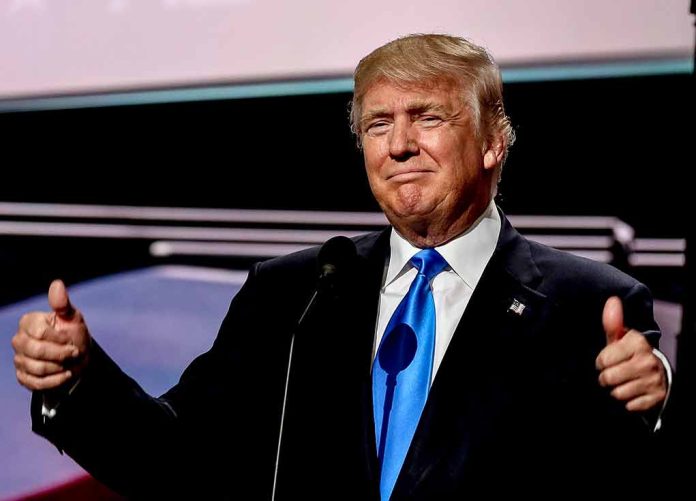
Florida Governor Ron DeSantis announces a special legislative session to support President-elect Donald Trump’s immigration agenda, sparking controversy and opposition from within his own party.
At a Glance
- DeSantis calls for a special session starting January 27 to implement Trump’s immigration policies
- Florida prepared to assist in enforcing federal immigration laws, including potential use of National Guard
- Republican legislative leaders oppose the session, calling it “premature” and “irresponsible”
- Critics argue special session unnecessary, citing potential negative impacts on key Florida industries
- Contrasts with California’s approach, where Governor Newsom prepares legal challenges against Trump’s policies
DeSantis Calls for Special Session on Immigration
Florida Governor Ron DeSantis has announced a special legislative session to begin on January 27, just a week after President-elect Donald Trump’s inauguration. The session aims to align Florida’s policies with Trump’s anticipated immigration framework, signaling a proactive approach to federal-state cooperation on border control and illegal immigration enforcement.
DeSantis emphasized the need for legislation to impose additional duties on local officials and provide necessary funding to combat illegal immigration. He warned of potential suspensions for officials who neglect their duties in enforcing immigration laws, showcasing a hard-line stance on the issue.
President-elect Trump was elected with a mandate to stop illegal immigration and deport illegal aliens already in our country.
State and local officials in Florida will actively facilitate the Trump Administration’s policies against illegal immigration, and to do that we need to… pic.twitter.com/PHvNYvjAH6
— Ron DeSantis (@GovRonDeSantis) January 13, 2025
Republican Opposition and Criticism
Despite DeSantis’s enthusiasm, the special session has faced significant pushback from within his own party. Florida House Speaker Daniel Perez and Senate President Ben Albritton, both Republicans, have publicly opposed the governor’s call for a special session, deeming it “premature” and potentially counterproductive to Trump’s future efforts.
“It is completely irresponsible to get out ahead of any announcements President Trump will make, especially when uninformed or ill-timed state action could potentially impair or impede the success of President Trump’s forthcoming efforts to end illegal immigration, close our borders and protect the sovereignty of our nation” – Florida House Speaker Daniel Perez and Senate President Ben Albritton
The legislative leaders argue that the regular session, set to begin in March, would be a more appropriate time to address immigration and other pressing issues. They criticize DeSantis for presenting only “fragments of ideas” without detailed legislative proposals, highlighting a growing rift between the governor and state lawmakers.
Potential Impact and Controversies
The special session, if it proceeds, could result in significant policy changes and budget allocations. DeSantis has hinted at the possibility of activating the Florida National Guard and State Guard to assist in enforcing federal immigration laws, a move that could dramatically expand the state’s role in immigration enforcement.
“I’m going to call the Legislature into special session starting the week of Jan. 27,” DeSantis said during a press conference at the Florida Capitol in Tallahassee. “We have the next president taking office Jan. 20, we anticipate executive orders to be issued immediately after the swearing-in and the inaugural address.”
Critics argue that a special session is unnecessary and potentially harmful to Florida’s economy. They point out that current laws already facilitate collaboration between local law enforcement and federal Immigration and Customs Enforcement. Furthermore, concerns have been raised about the potential negative impact on Florida’s agriculture, construction, and tourism industries, which rely heavily on immigrant labor.
DeSantis called upon the Florida Legislature to convene a special session to prepare for sweeping immigration policies once Donald Trump takes office. https://t.co/4VtcKsQ3Y1
— Florida Today (@Florida_Today) January 14, 2025
Contrasting Approaches: Florida vs. California
Florida’s proactive stance on implementing Trump’s immigration policies stands in stark contrast to the approach taken by California. Governor Gavin Newsom has announced preparations for legal challenges against what he considers federal overreach, emphasizing state sovereignty and humanitarian considerations.
“We will work with the incoming administration and we want President Trump to succeed in serving all Americans. But when there is overreach, when lives are threatened, when rights and freedoms are targeted, we will take action,” Newsom said in a December statement.
This divergence highlights the growing polarization in state-level responses to federal immigration policies, with Republican-led states like Florida aligning closely with Trump’s agenda, while Democratic-led states prepare for potential legal battles to protect immigrant populations.
As the special session approaches, all eyes will be on Florida to see how this political drama unfolds and what implications it may have for both state and national immigration policies in the coming years.
Sources:
- DeSantis calls for special legislative session to implement Trump’s immigration crackdown in Florida
- Gov. DeSantis’ call for special session on immigration is unwarranted | Editorial
- DeSantis calls special session to implement Trump’s immigration policies | ABC27
- Florida legislative leaders push back on DeSantis’ call for special session on immigration – CBS Miami



